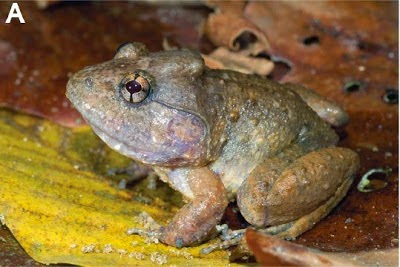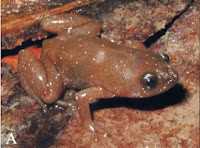Fanged Frogs of the genus Limnonectes
get their name from fang-like protrusions on the jaws of the male Frogs. They
are unusual for Frogs in that the males are larger than the females (the
reverse is usually the case), and apparently defend territories through
physical contests with other males, with females mating with the males with the
best territories. The males also often have greatly enlarged heads, sometimes
forming as much as half the body, apparently also an adaptation to this
lifestyle.
In a paper published in the Raffles Bulletin of Zoology on19
September 2014, Masafumi Matsui and Kanto Nishikawa of the Graduate School of Humanand Environmental Studies at Kyoto University and Koshiro Eto of the Kyoto University Museum describe a new species of Fanged Frog from Samarahan Division
in the state of Sarawak in East Malaysia (Borneo).
The new species is named Limnonectes cintalubang,
meaning ‘hole-lover’ in Malay, due to its being found dwelling in burrows. The
species is described from nine specimens, one male, two females and seven juveniles.
The male was 45 mm in length, the females 32.0 mm and 43.1 mm. The Frogs are a
dark chocolate brown colour, with pale undersides and small blue-white spots.
They did not appear to dig their own burrows, instead occupying what appeared
to be abandoned Rat burrows – although no Rats could be found living in the
area. The skin of Limnonectes cintalubang
is exceptionally fragile, which Matsui et
al. suggest may be a defence mechanism, the Frog losing part of its skin to
an attacker to evade capture.
Limnonectes cintalubang, male. Matsui et al. (2014).
See also…
Fanged Frogs of the genus Limnonectesare found across southern China and Japan, as well as the Philippines,
Southeast Asia and much of Indonesia. They are unusual in that the males are
considerably...
Cryptic species are species that closely resemble other species, and
cannot be separated by simple, non-invasive examination. While taxonomists have
known about cryptic species for a long time, it was not...
Cryptic species are species which resemble one-another physically, and
which cannot generally be separated using traditional taxonomic
methodology, but which are nevertheless genetically and reproductively
isolated. Genetic studies of many groups of...
Follow Sciency Thoughts on Facebook.




